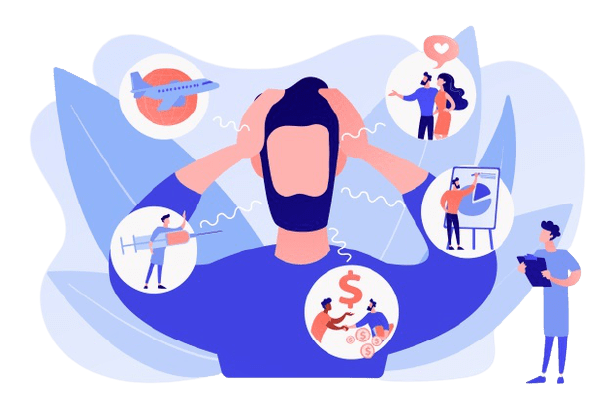Online Anxiety Counseling & Therapy | Top Therapists for Anxiety Help
- Set up a free & confidential chat on your anxiety issues
- Unlimited help through anxiety self-care app
- Live Video or Chat sessions with top anxiety therapists
Begin Therapy
Consult online with best Therapist
Best Online Therapy For Anxiety
At TherapyMantra, our licensed anxiety therapists provide comprehensive online therapy for anxiety, offering personalized treatment options to help you understand and manage your anxiety symptoms effectively
Match with Anxiety Therapists
We assign the best counselors experienced in anxiety issues based on your needs.
Affordable and Effective
Our online sessions are 90% less expensive than in-person therapy, available 24/7.
Self-Care for Anxiety
We offer ongoing anxiety support through self-care tools, anxiety help videos, chat groups, meditations, breathing exercises, and other resources.

Wondering if it’s just a phase or something more? Take our Free online anxiety test to find out?
How it works?
You are matched with an anxiety counselor based on your needs and preferences. You get a secure “therapy room” where you can communicate with your counselor via chat or phone. You can write or talk about anxiety & ask questions to deal with anxiety.

Register for anxiety Counseling
Simply complete a 5-minute online form to tell us about your anxiety issues

Consult with your anxiety Therapist
We connect you with anxiety counselors who are available 24/7 based on your preferences and needs.

Connect to Our App
Apart from Video/chat sessions, our app offers self-care tools, videos, and meditations to help you deal with your anxiety.
Best Anxiety Therapists
Positive conversations, exercises, and meditations are used by TherapyMantra psychologists to help you deal with anxiety. Our anxiety therapists outperform traditional counseling as you get matched from a pool of 500+ anxiety counselors, who offer 24/7 unrestricted private chat.
What Is Anxiety?
Anxiety is a mental health disorder that is characterized by feelings of worry, fear, and unease. It is the most common mental health disorder in the United States, affecting 40 million adults. Anxiety can cause physical symptoms such as chest pain, shortness of breath, and headaches. It can also cause emotional symptoms such as feeling overwhelmed, tense, and nervous.
One of the most difficult parts of living with anxiety is that anxious thoughts are often repetitive, intrusive, and extremely unpleasant. People may experience negative or fearful thoughts about themselves, their loved ones, and the world around them – no matter how irrational they may be. This can lead to significant problems in social interactions and relationships as well as at work.
Types Of Anxiety
Anxiety disorders are a group of mental disorders characterized by feelings of anxiety and fear. Anxiety can be classified into several types. These are:
Generalized Anxiety Disorder
It’s an anxious state characterized by persistent anxiety and concerns about tasks, people, or even events. The most important thing is that the worry is out of proportion and has nothing to do with the scenario. It’s tough to keep under control, and it has a significant impact on a person’s physical health. It frequently leads to sadness.
Agoraphobia
Agoraphobia is an anxiety disorder in which you worry about being trapped, helpless, or embarrassed when exposed to certain situations or places. People who suffer from agoraphobia prefer to be alone because they feel secure.
Panic Disorder
Symptoms of this sort include persistent episodes of extreme fear that may occur suddenly and peak in a few minutes. Shortness of breath, chest discomfort, fluttering, or pounding heart are some of the negative effects. When they start recurring, again and again, these characteristics might be distressing.
Social Anxiety Disorder
Social gatherings such as Anxietyget-together or hanging out with friends are avoided by individuals who suffer from this type of anxiety disorder. It’s due to the fear of being judged poorly by the other participants in the group, as well as embarrassment, self-consciousness, and worry about seeming stupid.
Obsessive-compulsive Disorder (OCD)
Obsessive-compulsive disorder is a mental illness that traps people in cycles of obsessive thoughts and compulsive behaviors. People with OCD are plagued by persistent, unwelcome thoughts or images (obsessions), often followed by rituals they feel they must perform to lessen their anxiety (compulsions).
Posttraumatic Stress Disorder
It’s a debilitating condition that can develop after exposure to any event that results in psychological trauma. Symptoms may include flashbacks, avoidance of reminders of the traumatic event, and increased anxiety or emotional arousal (hypervigilance). Explore our stress management techniques for better help.
Specific Phobias
A specific phobia is an intense fear associated with a specific object or situation which provokes anxiety and typically causes sufferers to avoid the feared object or situation.
All of these disorders can have a crippling effect on someone’s quality of life, making it difficult to do everyday activities and enjoy life. However, there is help available. With the right treatment, people with anxiety disorders can lead normal, happy lives.
Treatment options for anxiety
When it comes to anxiety, different anxiety treatment options are available. Some of the most common treatments include therapy, medication, and self-help strategies.
Therapy
Therapy is a treatment option that involves working with a therapist to address the issues that are causing the anxiety. This can be helpful for some people, as it allows them to explore the issues in a safe and supportive environment.
Medication
Medication is another common treatment option for anxiety. There are a variety of medications that are available, and each person will respond differently to them. It is important to work with a doctor to find the medication that is best suited for you.
Self-help strategies
Self-help strategies are also common for people who struggle with anxiety. These strategies are generally carried out on your own and can involve anything from developing coping strategies to watching certain types of media. One type of self-help strategy that has become more popular in recent years is anxiety meditation.
How can therapy help with anxiety?
Anxiety is a highly complex and potentially fatal condition that stems from a variety of factors. anxiety isn’t easily overcome; it’s a difficult, sometimes life-threatening problem that may be caused by a number of things. While certain people can manage their anxiety on their own, and anxiety therapist can offer valuable insights as well as various unique treatment options frequently.
Treatment can help you figure out what’s causing your anxiety. Anxiety therapists employ a variety of non-invasive techniques to facilitate the processing of thoughts, feelings, and events that may be linked to your symptoms. Therapists also look at physiological factors that might cause depressive episodes, as well as other treatments such as psychotherapy.
Therapy options for anxiety
There are many different therapy options for anxiety-
1) Psychotherapy
Psychotherapy (also called “talk” or “counseling” therapy) is the general term for treating an anxiety disorder by talking with a mental health professional. There are several types of psychotherapy that can help people manage anxiety, such as:
2) Cognitive-behavioral therapy
Cognitive-behavioral therapy (CBT). CBT helps you understand how your thoughts, beliefs, and actions affect your feelings and behaviors. It also teaches coping skills to help you deal with stress.
3) Exposure therapy
Exposure therapy. Exposure therapy helps you face your fears gradually and safely. This type of therapy is often used to treat phobias and social anxiety disorder.
4) Dialectical behavior therapy
Dialectical behavior therapy (DBT). DBT helps you learn how to manage your emotions, tolerate stress, and improve your relationships. It teaches specific skills to help you more effectively manage your anxiety and find relief from distressing symptoms.
5) Family therapy
Family therapy involves family members in the treatment process so they can support each other while coping with an anxiety disorder. This type of therapy may be appropriate if the person with an anxiety disorder lives at home with their family.
How to Find an Anxiety Therapist?
Finding the right support for anxiety can feel overwhelming, but you don’t have to do it alone. At TherapyMantra, we make it easy to connect with trusted and experienced anxiety therapists near you. With over 500+ licensed therapists listed in our therapist directory, you have access to a wide range of professionals who specialize in treating anxiety disorders, including social anxiety, panic attacks, and generalized anxiety disorder (GAD).
Here are a few simple steps to help you find the best anxiety counselor for your needs:
- Get a referral from a trusted source – Ask your family doctor or any healthcare provider for a recommendation for an anxiety therapist.
- Talk to friends and loved ones – Personal recommendations can help you feel more confident about your choice
- Search online directories – Use trusted websites like TherapyMantra’s therapist directory to explore profiles, reviews, and therapy options tailored to your needs.
10,000+ Happy & Healed anxiety patients

“After years of dealing with anxiety issues, Therapy Mantra assisted me in releasing a lot of buried emotions. I had previously received anxiety counselling, which helped, but Therapy Mantra was able to turn me around and make me look forward to a better life.”
Kevin,
1 year on TherapyMantra
FAQs
Anxiety is a feeling of unease, such as worry or fear, that can be mild or intense. Everyone experiences anxiety at some point in their life. For example, you may feel anxious before an important interview or test. However, if you feel anxious most of the time and it interferes with your daily life, you may have an anxiety disorder.
The cause of anxiety disorders is unknown. However, there are many factors that may increase your risk, including:
– Genetics – Anxiety disorders tend to run in families.
– Stressful life events – traumatic events, such as a death in the family or a divorce, can trigger an anxiety disorder.
– Other mental health disorders – having another mental health disorder, such as panic disorder, depression or alcoholism increases your risk for an anxiety disorder.
– Changes in brain development – experts believe an imbalance in neurotransmitters (naturally occurring chemicals in the brain) may be responsible. This possibility is supported by research showing anxiety disorders tend to run in families and can be inherited.
Yes. Childhood anxiety disorders may continue into adulthood and require treatment.
Yes, online therapy is highly effective for treating anxiety. It offers flexibility, privacy, and access to licensed anxiety counselors from the comfort of your home. Many people find online therapy just as effective as in-person sessions for managing symptoms of stress, social anxiety, panic attacks, and more.
Absolutely. With TherapyMantra, you can receive personalized anxiety treatment online from trained therapists. Our platform connects you with mental health professionals who use proven methods like CBT (Cognitive Behavioral Therapy), mindfulness, and talk therapy to help you manage your anxiety.
The 3-3-3 rule is a simple technique used to ground yourself during an anxiety episode. Look around and name 3 things you see, 3 things you hear, and move 3 parts of your body. It helps you stay present and calm when anxiety starts to feel overwhelming.
The 5-5-5 rule involves taking 5 deep breaths, acknowledging 5 things you can see, and thinking of 5 positive affirmations. It’s a mindfulness technique that can reduce anxiety and help bring your mind back to the present moment.
You can use TherapyMantra’s therapist directory, which lists 500+ certified professionals across India. Filter by experience, specialization, and therapy approach to find a suitable anxiety counselor who matches your needs and preferences.








